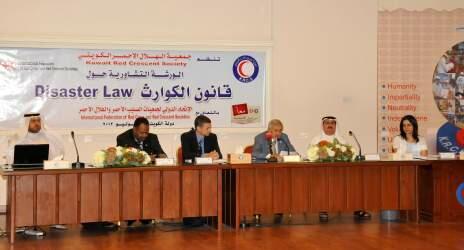
The workshop gathered participants from approximately a dozen Kuwaiti ministries and governmental departments potentially concerned with the regulation of international disaster relief.
In his opening speech, KRCS Deputy Chairman Dr. Hilal Al-Sayer emphasized the responsibility of National Societies and governments to prepare themselves adequately, even for infrequent disasters. “We like to think that disasters are tragic events that happen in other countries, to other people, they couldn’t happen to us here. Yet the unthinkable can and does happen, if not in our own backyard, then in our neighbour’s,” he observed.
With regard to IDRL, Dr. Hilal noted that recent disasters had seen many problems due to a lack of legal preparedness, including an over-abundance of outside helpers. “Over a period of time many organisations and individuals have joined the rush to deliver all important medicines, food, supplies, equipment and personnel as quickly as possible to a disaster stricken area, frequently pressurizing governments to give them access without any regulation of, or guidance for, any of the players, and often resulting in large numbers of inexperienced and untrained personnel overwhelming the disaster zone causing delays and hindering the coordinated efforts of the experienced first responders.”
Participants were introduced to key international and regional instruments for the regulation of international disaster relief as well as relevant provisions in Kuwait’s own laws. KRCS Director of Disaster Management Yusef Maraj described some of the regulatory barriers his National Society had experienced providing emergency aid after disasters in the Middle East, Asia and the Americas, in areas such as visas, customs clearance, tax, demurrage fees and transport permissions. He also encouraged participants to consider ways that the KRCS and Kuwaiti government could increase their cooperation to try to overcome these barriers and also to increase inter-operability in their foreign deployments.
Participants debated how to balance national sovereignty and the humanitarian imperative and how to ensure speedy relief while avoiding “dumping” and uncoordinated efforts. Some noted their feeling that binding international instruments were needed to regulate this area, though it was acknowledged that a regional treaty in the Middle East, the Arab League Cooperation Agreement Regulating and Facilitating Relief Operations, had seen little direct implementation.